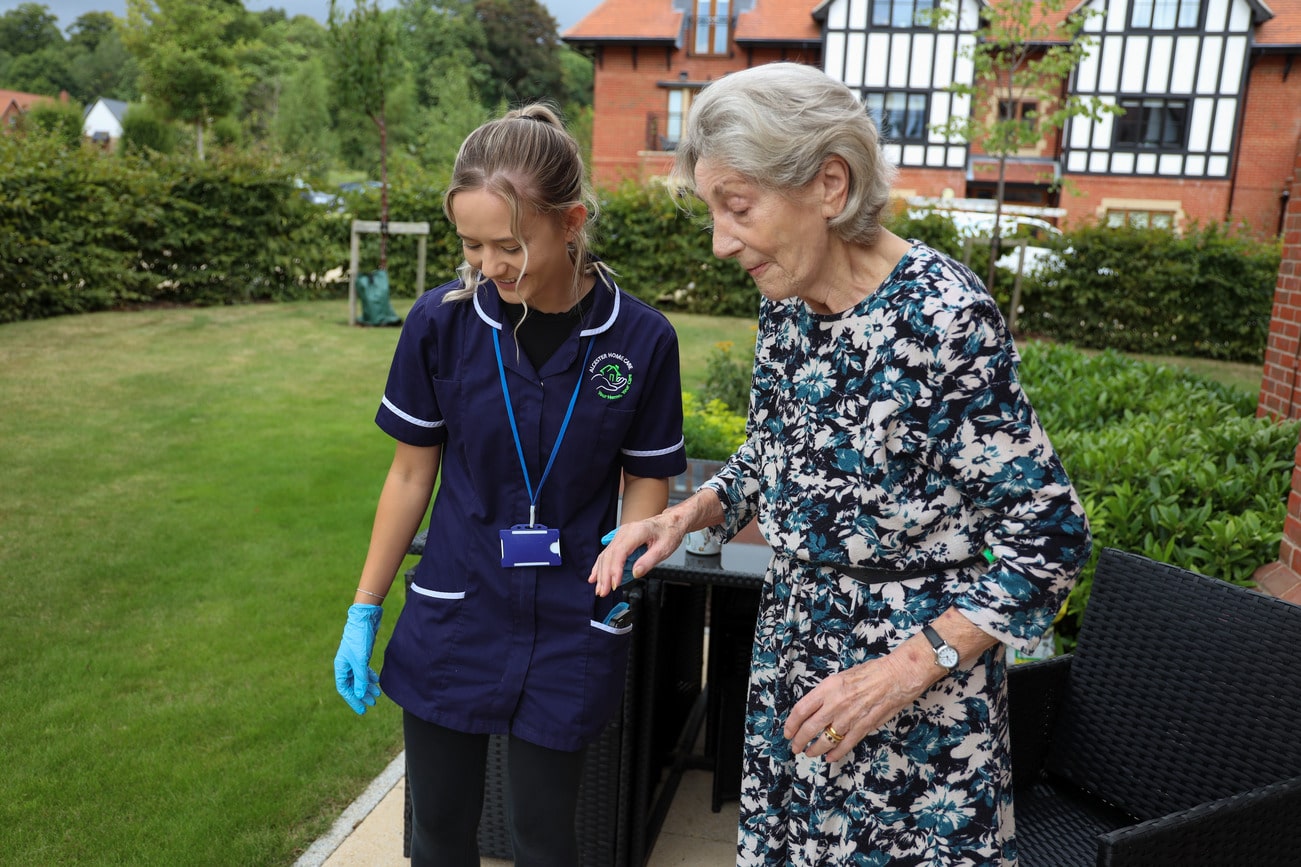Becoming a carer can be a rewarding career choice, particularly for those who enjoy helping others and making a difference in their lives. Working as a carer means providing essential support to individuals who need assistance, whether that be daily activities, general tasks, or managing conditions.
There are various ways to start a career in this industry, such as enrolling in courses and programmes or joining a recognised care agency, such as Alcester Home Care.
During the training stage of your career, you will learn the necessary skills required for providing an exceptional level of care to make a recognisable difference in many people’s lives.
Working as a carer is not just about helping with tasks but also about forming meaningful connections with those in need. This makes it a fulfilling job for many. Opportunities in home care allow carers to support individuals in their own homes, fostering a comfortable environment for both the carer and the client

What is an In-Home Carer?
An in-home carer provides essential support to individuals who need help in their own homes. This role allows the elderly or disabled to remain in familiar surroundings instead of moving to a care facility. Carers offer both physical and emotional support, making sure that their clients are safe, comfortable, and well cared for.
Primary Responsibilities:
- Personal Care: Assisting with daily activities including bathing, dressing, medication management, mobility assistance, and meal preparation
- Companionship: Providing social interaction and emotional support
- Household Tasks: Performing light cleaning, laundry, and cooking
Carers often handle tasks like managing medications and keeping their clients engaged and active. They also ensure a safe home environment. The ability to handle varied responsibilities makes this job both fulfilling and challenging
Carer Requirements:
Carers must have a compassionate nature and strong communication skills. Many roles require specific training or certification, especially for medical tasks. In some cases, previous experience in a care setting may be beneficial, but it is not always mandatory. Being able to drive is often necessary as carers need to travel to the homes of those they assist
The role of an in-home carer can vary substantially based on the needs of the client. Some carers will give round-the-clock live-in care, while others make daily or weekly visits. Caring provides a flexible means of employment, there are often job roles to suit the caring style you would prefer, enabling you to work around your lifestyle preferences.

Working as a Carer
Carers play a vital role in providing support to people who need help with daily tasks. This type of job involves various responsibilities, requires specific skills, and offers many personal rewards
Daily Responsibilities
A carer typically assists clients to enable them to achieve a more independent and comfortable life. A carer is required to be flexible to adapt to the support that best suits their patient.
Carers help to create a comfortable and safe living environment, manage conditions, and assist with the mobility of their patient. With no day that is ever the same, a role as a carer offers an opportunity for a career filled with variation and a high level of job satisfaction.
Carers might also be involved in anything from scheduling medical appointments and providing transportation, to administering medications and offering emotional support. Being observant is crucial. They need to notice any changes in their client’s condition and communicate these to family members or healthcare professionals as required. Their priority is to ensure the client receives the appropriate care and support they need
Types of In-Home Care
In-home care varies widely based on the client’s needs. Some carers provide personal care services that support clients with their daily activities. Others focus on companionship, helping clients with social activities and providing emotional support
Some carers may also be required to provide care to clients through the night to ensure there is round-the-clock assistance if it is required, this is known as overnight care. This type of care is essential for individuals with significant health needs requiring constant supervision
Respite care is another valuable service. It allows primary caregivers, often family members, to take a break while the carer steps in to provide necessary support
For patients who suffer from more complex conditions, Complex Care provides an extra level of assistance. This type of care brings the highest quality of care to a patient’s home to create a more comfortable living environment.
Some conditions require specialist care, this includes Dementia Care. Dementia and similar conditions require carers to provide a unique service that is aimed at assisting patients and enhancing independence for as long as possible
Required Skills & Qualities
A carer needs patience, empathy, and strong communication skills. These qualities help them effectively interact with clients and understand their needs. Being organised is critical, as carers often manage a variation of tasks daily
Physical fitness is another important aspect since the job can be physically demanding. Lifting and assisting clients require strength and care, while problem-solving skills enable carers to handle unexpected situations and find quick solutions
Emotional resilience is also vital, especially when dealing with clients facing challenging health conditions. This resilience helps carers keep a positive outlook while supporting others
The Benefits of Becoming a Carer
Working as a carer offers many rewards. It provides an opportunity to make a significant difference in someone’s life. The role also offers flexibility, allowing carers to choose working hours that suit their lifestyles
The demand for carers is increasing. This trend ensures job security in this field. Many carers find personal satisfaction in building strong relationships with their clients and knowing they are providing valuable assistance
For those who enjoy helping others, being a carer can be a fulfilling career path. It allows them to give back to the community while developing unique skills and experiences

Becoming a Professional Carer
Becoming a professional carer involves gaining the right skills and training, along with an understanding of career opportunities. This career path can be rewarding for those passionate about helping others
Certification and Training
To start a career in care, most individuals need GCSEs in English and Maths. Prospective carers often complete training courses covering essential topics such as first aid, safeguarding vulnerable adults, and basic healthcare skills
A DBS check is commonly needed to ensure safety when working with vulnerable people. Some choose to pursue additional qualifications, like NVQs in Health and Social Care, to further their skills and boost employability. Alcester Home Care provides on-the-job training and opportunities for continuous professional development
Job Prospects and Progression
The demand for professional carers remains strong, reflecting the growing needs of the ageing population.
Career progression in this field is possible through gaining more experience and certifications. Positions that carers may aspire to include senior carer roles, supervisory positions, or specialised areas such as dementia care. Gaining experience and furthering one’s qualifications can open doors to higher responsibilities and better pay within the care sector
In-Home Carer Opportunities
In-home carers play an essential role in supporting individuals’ well-being within their own homes. Opportunities for such positions are growing, this includes roles at Alcester Home Care, where we work to offer support to people in regions around Alcester, Worcester, and Warwickshire, offering a chance to make a real difference in community care
Finding In-Home Carer Jobs
Building a strong resume highlighting relevant experience and skills can improve job prospects. Networking with local care providers and attending job fairs can also open up new opportunities.
Agencies like Alcester Home Care provide ongoing training and development, ensuring carers remain knowledgeable in best practices. As demand for in-home carers rises, the prospects for those entering this field in these regions are promising
Frequently Asked Questions
For those interested in becoming a carer, understanding the path to starting, the necessary qualifications, and what jobs entail is crucial. This section will address common questions related to starting and working as an in-home carer
How can I start a career in care work with no prior experience?
Starting a career in care without experience is possible, as many care providers offer training programs. Showing empathy and a willingness to learn can enhance your chances. Seeking entry-level positions or volunteering helps gain practical insights into the industry
What are the necessary qualifications to serve as a carer in the UK?
In the UK, it is not mandatory to gain a formal qualification to become a carer, however almost all recognised care providers will require you to have proof of training, or train you themselves to show that you meet their chosen care criteria – this is usually in the form of a Care Certificate, an NVQ, or a diploma. At Alcester Home Care, we provide on-the-job training for all successful care applicants to ensure they have all of the necessary skills to provide the excellent level of care we strive to provide
What are the responsibilities of someone working as a care assistant?
Care assistants have a very varied role in the care industry, requiring someone who is adaptable and compassionate. They work to ensure patients remain as independent as possible while providing any essential care that is necessary.
This could be providing essential support, including personal care, meal preparation, aiding with mobility, and assisting with medication. They may also assist with medication management and offer companionship for those who are in need. The responsibilities vary depending on the needs of each client
A care assistant position is an extremely rewarding role, demonstrating the positive impact your work can have on others.
Can I secure a job in care in the UK with visa sponsorship?
Some care jobs in the UK offer visa sponsorship, especially for high-demand roles. Sponsorship depends on the employer’s ability to fulfil regulatory requirements and candidates meeting skill criteria. It is always important to check company policies regarding sponsorship
What are the legal requirements to become a home carer?
Home carers must adhere to legal standards, which include background checks and proper training. Mandatory qualifications, such as the Care Certificate, ensure that carers are knowledgeable about safety and quality standards. Compliance with local regulations is essential
Can I be a carer without formal qualifications?
While formal qualifications are beneficial, they are not always required. Some roles may start with training provided by employers. Gaining hands-on experience and developing a strong capability to meet the needs of clients can also pave the way to a successful career in care
